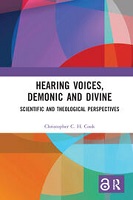Hearing Voices, Demonic and Divine
Proposal review
Scientific and Theological Perspectives
Author(s)
Cook, Christopher C.H.
Collection
WellcomeLanguage
EnglishAbstract
The Open Access version of this book, available at www.taylorfrancis.com/books/9781472453983, has been made available under a Creative Commons Attribution-Non Commercial-No Derivative 4.0 license. Experiences of hearing the voice of God (or angels, demons, or other spiritual beings) have generally been understood either as religious experiences or else as a feature of mental illness. Some critics of traditional religious faith have dismissed the visions and voices attributed to biblical characters and saints as evidence of mental disorder. However, it is now known that many ordinary people, with no other evidence of mental disorder, also hear voices and that these voices not infrequently include spiritual or religious content. Psychological and interdisciplinary research has shed a revealing light on these experiences in recent years, so that we now know much more about the phenomenon of "hearing voices" than ever before. The present work considers biblical, historical, and scientific accounts of spiritual and mystical experiences of voice hearing in the Christian tradition in order to explore how some voices may be understood theologically as revelatory. It is proposed that in the incarnation, Christian faith finds both an understanding of what it is to be fully human (a theological anthropology), and God’s perfect self-disclosure (revelation). Within such an understanding, revelatory voices represent a key point of interpersonal encounter between human beings and God.
Keywords
gods; avhs; visionary; experience; hebrew; scripture; temporal; lobe; epilepsy; religiousDOI
10.4324/9780429423093ISBN
9781472453983;9780429750953;9780429750939OCN
1135854100Publisher
Taylor & FrancisPublisher website
https://taylorandfrancis.com/Publication date and place
2019Grantor
Classification
Religion and beliefs
Religion: general
Religion and science
Christianity


 Download
Download Web Shop
Web Shop